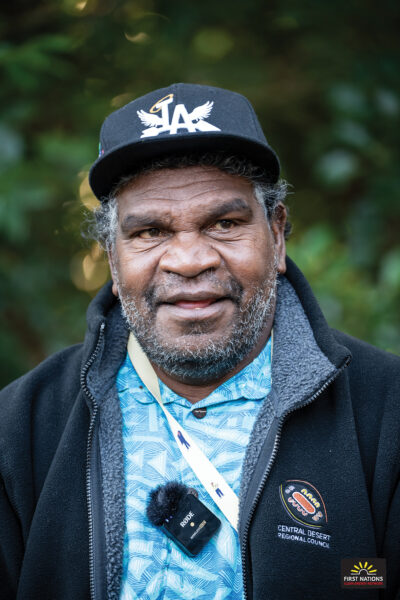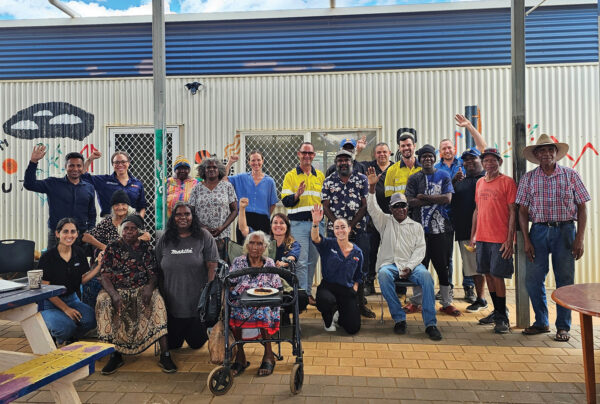
Rising temperatures and extreme weather are pushing up electricity costs, leaving more remote community households without power when they need it most.
Yuelamu’s Granites Mine Affected Area Aboriginal Corporation (GMAAAC) committee is setting up a community-owned solar microgrid to improve electricity supply to households. The committee is working with Original Power, which supports Aboriginal communities to move to renewable energy.
Yuelamu GMAAAC director and member of the Australian Government’s First Nations Clean Energy Advisory Committee, David McCormack, said residents cannot afford the high cost of rent and power.
“We use power cards, and when the money runs out we have no power. During extreme weather the power lines break and we are without power for 16 or 17 hours. This happens a lot.
“The food in the fridge goes bad and needs to be thrown away. People lose hundreds of dollars of food.”
GMAAAC director Cliffy Tommy, also from Yuelamu, said people can’t store their medications safely. “Some of my relatives have new kidneys and they need medication to be refrigerated.”
In summer Mr McCormack pays around $150 a week to cool two rooms in his home. “Air conditioning chews up a lot of money. That’s why we are looking at a community-owned microgrid to provide cheaper power to households.”
Original Power is studying how the community, three hours northwest of Mparntwe (Alice Springs), uses its power and what it would take to connect the microgrid to the Yuendumu power station, half an hour’s drive away.
The community is working with Original Power and other partners to understand the system load requirements and the grid’s capacity and power outputs.
Original Power will help the community identify government and other funding sources for the project.
While t h e r e a r e powe r disconnections throughout the year, when temperatures rise above 40 degrees disconnections also rise dramatically, especially in the NT.
Original Power used prepayment meter data to show that remote NT communities using prepayments averaged 55 disconnections per year while South Australia’s Anangu Pitjantjatjara Yankunytjatjara lands averaged 14 disconnections and remote Western Australian communities 33.
It said South Australia prepayment tariffs were fixed at 10 cents per kilowatt hour, compared with 31 cents in the NT.
Energy retailers in the NT are not required to report prepayment disconnections. As a result, energy insecurity in the territory is largely hidden.
The Central Land Council has called on the NT Utilities Commission to make power retailers report all disconnections in remote communities and apply the same electricity retail reporting requirements across the territory.
The NT-based Climate Justice Alliance predicts the NT is heating up dangerously. The Alliance’s Dr Ned Bible said she used publicly available Climate Council data to forecast how hot it will be in 72 Northern Territory communities by 2050 and 2090.
“It showed if we stay on our current path, by 2050 Alice Springs and Katherine would experience more than twice as many days over 40 degrees than now, and Darwin would have 92 more days over 35 degrees Celcius than currently.”
Dr Bible said remote communities in the north of the NT, such as Tennant Creek, were already suffering hotter days and nights as humid air from Darwin moved further south.
She said remote communities will be hit by the double whammy of extreme heat and unaffordable power. This combination will worsen chronic disease and increase the risk of heat stress, particularly for the elderly, the very young and those already sick.
The NT government is planning to replace 55 remote community diesel power stations with renewable energy. The CLC and the Northern and Tiwi land councils are working with the government to ensure the renewable energy transition benefits residents.
They want to bring the cost of power down so there are fewer disconnections. They also want residents to get training and jobs out of the construction and operation of the renewable energy.
CLC chief executive Les Turner said Aboriginal people need affordable power so they can survive and thrive on country as the climate heats up.
“Cheap and reliable power in communities like Yuelamu is essential to the health and wellbeing of families,” he said. “Our people are among the hardest-hit by man-made climate change and have done the least to contribute to it. It’s only fair that they are part of the clean energy transition.”

